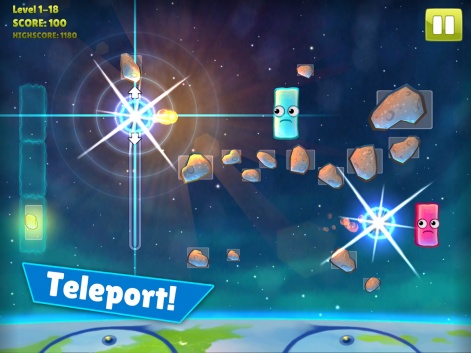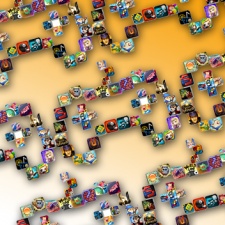It's no exaggeration to suggest that, when indie bundles arrived on the PC gaming scene, they changed the way consumers bought games forever.
Collecting a batch of independent games and reducing the price to the point at which it felt ridiculous not to buy it, companies like Humble pioneered - and profited significantly from - this business model.
Jose Iria, founder of ikoid, took an especially keen interest in the rise of indie game bundles. For the unaware, ikoid is a bundle platform for Android, which bills itself as being as much about helping developers get a slice of the action in what is an especially crowded marketplace as it is helping gamers – in its own words - find "underrated gems that may have escaped your radar".
Iria isn't bold enough to claim ikoid is doing anything revolutionary, however. Like many , he attributes the initial bundle boom to the shrewdness of Humble.
"The release of games like Braid in 2008 helped cement the reputation of indie games," he tells us.
"And by the time the first Humble Bundle went on sale in 2010, I think many people were really excited about indie games.
"Humble was not only in the right place at the right time - I remember attempts to market indie games from as early as 2005, most of which failed - but they also got it right by pioneering pay-as-you-want in this form, introducing the charity component, and managing to get crucial attention from the mainstream press."
Start-up
By 2013, with indie bundles firmly established as part and parcel of PC gaming, Iria was ready to launch his own game bundle platform for Android devices. But what was the inspiration for ikoid? And why did Iria believe that this business model, only proven on PC, would succeed in the vastly different mobile marketplace?
"A number of things converged around summer 2013 that led to the creation of ikoid," Iria tells us. "Me and another member of the team had been working on something similar to ikoid for some time, but targeted at the console market. During that time our own habits and perceptions as consumers of video games had changed.
"Less time to play meant that being able to play on the go, or in short bursts, was becoming increasingly important in our lives. Paying for digital products had become a more quotidian affair and 'indie' had become the new retro for us, delivering the core gameplay that we sought in the old titles."
Indie had become the new retro for us, delivering the core gameplay that we sought in the old titles.Jose Iria
Indeed, despite the pared-back nature of the games it features, ikoid does seem like a remarkably modern conception. Independent Android games, often made by small teams or even individuals, are bundled together for one price - usually at an 80 percent discount.
It speaks to two uniquely modern issues - the unwillingness of the consumer to pay full price for Android games, and the plight of the undiscovered, underappreciated developer.
"I remember that very early in the design of ikoid we became aware of the difficulties indie developers and small companies face when trying to market their games", Iria continued. "In most bundles there are one or two games which take a large chunk of the earnings, while the other developers join mostly for the visibility."
And, of course, ikoid is still a business: "We usually take a small share as well, which is considerably smaller than the app stores."
Perspectives and feedback
There are certainly potential issues with ikoid’s system, mainly involving this uneven distribution of bundle earnings. It’s seemingly a that which more heavily compensates the bigger names for their involvement, using them as bait, while smaller developers sign up in the hope of riding their coattails.
However, after speaking to Iria, his intentions never feel as cynical as this. The ikoid team display a genuine passion for indie games, with a collective taste he describes as "far from mainstream".
And furthermore, he’s very keen to point out the ways in which ikoid’s involvement has yielded positive results for independent developers.
"We have obtained good feedback from developers, with no exception", Iria reports. "In addition to the earnings arising from participation in our bundles, some developers have observed increased sales on the app stores during the period of the bundle.
"From the developer’s perspective the goal is achieved, and we are happy to be the trigger that may have contributed to that."
Edward del Villar, the one-man developer of Android puzzler Naughty Bricks, seems to concur with this. Naughty Bricks was featured in ikoid’s third bundle, which ended in January. And while he doesn’t report any significant earnings from its inclusion, del Villar certainly does not regret his participation.
"The people at ikoid were good to talk to. They seemed genuine, honest, and they paid almost immediately after the bundle offer was over, which is a good sign in my book," details del Villar.
"My bread and butter work is contract animation, and the time it takes a client to pay from when they first receive an invoice says a lot about how professional and respectful they are.
"ikoid only made me just over $100", he continues. "In total, the bundle sold about 600 units. Was it worth it financially? No. But would I do it again? Probably. It didn't take long to set up, and it got the game out to a few hundred more people than were playing it at the time."

Since the bundle, del Villar has made Naughty Bricks - a project which he describes as "not financially successful in any way, selling only a few hundred units when it was a paid game" - completely free on both Google Play and iOS, without any adverts or in-app purchases.
"After seeing the launch numbers and quickly realising that nobody was going to buy my game, I dramatically readjusted my expectations to zero", says del Villar. "So at that stage, $100 felt like a nice bonus."
After quickly realising that nobody was going to buy my game, I dramatically readjusted my expectations to zero.Edward del Villar
Going free kickstarted a dramatic surge in interest for Naughty Bricks - "20,000 downloads in a week, lots of five star ratings" - numbers which make the "few hundred" extra players pulled in by ikoid seem relatively insignificant.
It’s also a stark demonstration of the power of free games in today’s mobile landscape - a mentality with which bundle platforms like ikoid, no matter how good the intentions or curation of the people behind it, will ever be able to compete with.
All in all, then, Edward del Villar’s message is pretty clear: ikoid’s unlikely to make you rich, but it’s a nice little exposure boost for struggling indies.
"I'd encourage other very small, financially unsuccessful developers like myself to include their game in a bundle, because why not?", he says. "But if your game has any sort of traction on Google Play then it's probably not worth your time financially."
Others shared positivity, too. Gabriel Koenig, a developer whose game - Soul Power - featured in ikoid’s sixth bundle, praised Iria and his team for seeking out less successful games.

"In my interactions with ikoid, nothing specific was ever mentioned about my game", reveals Koenig. "But I think the fact that they chose Soul Power, a game with less than 300 downloads, speaks for itself.
"It shows that they must be sifting through and looking for games that offer a more interesting experience than the average mobile title."
Curation
With any bundle platform, the curation of content is always going to be a big part of the appeal - especially on open platforms, where interesting games can so easily be buried.
"Publishing on Google Play feels a lot like screaming into the darkness", Koenig says. "A developer puts a lot of effort into the thing they've created and then it just gets absorbed into this massive library of apps where it may never be seen by anyone."
ikoid, then, should be a good solution - a platform which highlights games based on factors other than marketing heft or download numbers.
"Our first step is to listen to the community", Iria says. "We have a section of site where people can vote for games to be included in future bundles, and also submit suggestions. We also follow relevant Android online publications and what communities are saying on sites like Playboard, forums, and so on."
However, Iria presents the world of Android gaming bundles as one which defies prediction, each bundle’s success being incredibly sensitive to a number of factors - the obvious one being price.
"Pricing of the bundle is a fundamental one, of course", Iria tells us. "If we decide to feature a big name at the expense of a higher priced bundle, then we tend to see sales drop proportionally to the increase in price. There is a delicate balance to achieve regarding pricing on every bundle."
Theming and consistency have an unexpectedly large influence, too, while the inclusion of more established titles is said to have "not [increased sales] as much as I would have initially thought."
"Having games that go well together is an influential factor", says Iria. "Introducing a big name that spoils the theme of a bundle usually has an adversarial effect, regardless of how popular the game is. Therefore, I would say that a single big name is typically not enough to guarantee good sales, but it is surely a trump that, when played correctly, can yield excellent results."
Iria continues, "Our seventh bundle, ‘Android Legends’, included the hundred-thousand sellers Devil’s Attorney and Sentinel 3: Homeworld - and it sold more than any other bundle, but as a counter-example, our fourth bundle, ‘Dark Soul’, included far less impressive names but sold extremely well too. We believe that’s due to its theme."
"Simple things like the name of the bundle can have an unexpected positive or negative effect", Iria remarks, summing up the unpredictability of his business.
"At this stage I would say sales have reached a relatively stable plateau, which is a healthy reminder for us to continue improving our service and reach out to new audiences," he tells us - a fairly positive outlook for a company with only a year in operation under its belt.
Monetisation approaches
With Iria being the founder of a platform which largely features and supports paid games on Android, I asked him the obligatory question: what’s your stance on the business of free-to-play?
"With ikoid, there is no explicit attempt to support paid games, but that ends up happening as a byproduct of our business model", Iria tells us, with significantly less bile than many industry voices when asked about F2P.
The way I see game bundles evolving is for content curation to become tightly interwoven with the community.Jose Iria
"Naturally, premium games are immediately suitable to this business model, but certain forms of freemium are as well. For example, free games with unlockables within the app can be sold full version, or ad-supported games can be sold ad-free - we’ve done this a few times now."
However, when it comes to personal preference, it’s clear where Iria’s loyalties lie. "Both approaches have their merits, one approach being clearly more commercially oriented, while the other is more artistically oriented," he says.
"At ikoid we tend to build our audience around the latter, because it is from there that we have seen the most interesting games arise in the past, but at the same time we try not to be overly black and white about it."
This seems a healthy approach for a company like ikoid - finding its own niche in premium, worth-paying-for experiences, while appreciating F2P’s place in the industry and not rejecting it entirely.
So, one year since launch, what’s the future for ikoid? "The way I see ikoid evolve in particular, and game bundles in general, is for content curation to become tightly interwoven with the community that is active in consuming and influencing the creation of the bundles," Iria says.
"In my vision, each bundle site grows and nurtures an identity. Some people will go to Humble knowing they will get a ‘certain kind’ of game there, and they will go to ikoid because they know they will get some ‘other kind’ of game there.
"I am purposely avoiding assigning these ‘kinds’ of games a label, as it is not about genre, platform or monetisation model, but rather about community."
Thanks to Jose, Edward and Gabriel for their time.






















